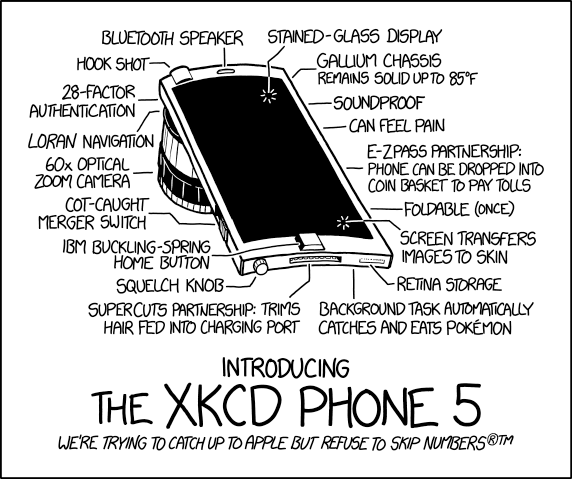Sociolinguistically aware smartphone
« previous post | next post »
Today's xkcd, with a "cot-caught merger switch":
Rumored in the XKCD Phone 6: a "Northern Cities Shift slider".
March 11, 2017 @ 10:15 am · Filed by Mark Liberman under Linguistics in the comics
« previous post | next post »
Today's xkcd, with a "cot-caught merger switch":
Rumored in the XKCD Phone 6: a "Northern Cities Shift slider".
March 11, 2017 @ 10:15 am · Filed by Mark Liberman under Linguistics in the comics
Powered By WordPress

DCBob said,
March 11, 2017 @ 2:50 pm
Should those who pronounce their 'r's prefer a rhoticity phone?
Marja Erwin said,
March 11, 2017 @ 3:13 pm
So is this the recent merger of /kot/ and /kot/ or the older merger of /kot/ and /koht/ or /koxt/?
Honestly, recognizing dialect differences would be a good idea.
I've tried different dictation software, and there's a big difference between software which can't recognize what I'm saying, and software which allows users to train it to our voices, and can recognize what I'm saying, but goes completely haywire for other reasons. I have no round vowels, and I have different syllable counts from people with some other dialects.
lynette mayman said,
March 11, 2017 @ 5:31 pm
I live in the USA but am a native GBE speaker. I have to fake an American accent to get my Samsung phone to understand me. I usually do a very broad overdone accent to get the phone to react with the correct message. It works like a charm, but forget those Rs and you are in trouble.
David Marjanović said,
March 11, 2017 @ 6:34 pm
The former; in the terms of (basically) England, where they stay distinct, cot is /kɒt/ and caught is /kɔːt/… or at least those were the transcriptions that made sense in Daniel Jones's time; nowadays /kɔt/ and /koːt/ would be a better idea.
Stephen Hart said,
March 11, 2017 @ 7:20 pm
re: lynette mayman's comment
I think nowadays accent coaching is much better, but it used to be that in British movies with an "American" character, the character's "American" accent was often comical.
rosie said,
March 12, 2017 @ 4:09 am
/koːt/? Really? That'd be côte.
Daniel Barkalow said,
March 13, 2017 @ 11:57 am
I'm still waiting for someone to turn off the Great Vowel Caps Lock.
Jarek Weckwerth said,
March 14, 2017 @ 4:37 pm
@rosie Yes, [o], absolutely. The main difference from côte would be the absence of aspiration on the /k/ and glottalization on the /t/. The vowel would be quite similar. Geoff Lindsey has a fantastic treatment of modern General British here, and a post specifically about this vowel (NORTH) here.
Jarek Weckwerth said,
March 14, 2017 @ 4:45 pm
BTW all of these kinds of discussions (of mergers etc.) are greatly helped by the use of Wells's keywords for English vowels. The use of any type of transcription makes things unnecessarily opaque. So, here, we're dealing with the LOT-THOUGHT merger.
Marja Erwin said,
March 15, 2017 @ 6:32 pm
Wells' keywords assume people use the same vowels in:
Kit, sing, and Syria.
Dress, egg, shelf, weather, and says.
Trap, rag, ham, hang, shall, lapse, arrow, and tassel.
And most puzzlingly for me:
Cure, boor, tour, abjure, and so on.
I don't have Well's original book, so I'm relying on online excerpts. It's possible that some of the differences are because I moved around, and I learned different words at different ages, but I doubt that explains the difference between kit and sing, or trap and rag, or cure and poor.
Jarek Weckwerth said,
March 16, 2017 @ 7:13 pm
@ Marja Erwin: It all depends on your definition of "people", I'm afraid. Wells quite explicitly states that the lexcial sets apply first of all to the two standard accents (RP and GenAm, in his own terminology). So it's not an assumption but a statement of facts that then enables description of specific accents by comparison.
And they don't explain anything, either. They are a descriptive tool; labels that are less committed to specific phonetic realizations than e.g. /ɪ/ or even "short i".
Thus, in your case, you could say that kit and sing do not belong to the same lexical set. (And, BTW, I think this is still the more unusual situation across English accents than having them in the same set.)
The explanation in this case would be the influence of the velar nasal, which often has a "raising" effect on the vowel. On its own it's not that interesting phonologically. Your puzzlement is the interesting bit, because it shows that you feel them to be different, which strongly suggests that the distinction has a "phonemic" character despite the fact that you wouldn't be able to find minimal pairs. And this could be described by saying that, e.g., sing belongs to another lexical set or forms its own separate set.
Marja Erwin said,
March 17, 2017 @ 3:35 pm
But it makes it hard to usee these keywords for discussions of how other dialects handle these vowels.
I can't point out minimal pairs for all of these, but for my speech, I can point out minimal pairs for some of the vowels in each of these classes.
KIT: Bit and beat. Fit and feet. Nil and Neil. (Kit and Syria respectively)
DRESS: Bess and base. (Dress and egg)
TRAP: Cap and cop and cape. (Trap and shall and rag)
CURE: Year and ear and or and er. (Cure and not listed and boor and abjure.) Near and nor and newer. Sear and soar and sewer. Fear and for and fewer. (not listed and noor and tour.)